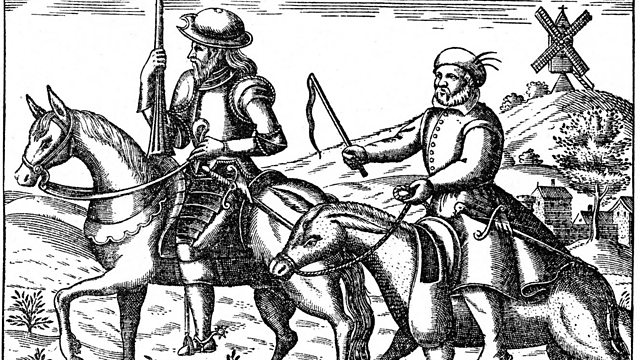
An Unquiet Mind
Texts and music on the theme of an unquiet mind, with readings by Katherine Parkinson and Greg Wise. With Cervantes, Tolstoy and Orwell, plus Berlioz, Strauss, Britten.
From the madwoman in her attic to the troubled king straining against the leashes of his medical attendants, the depiction of what has historically been called madness has been a common theme in art, music and literature. It has engaged both those who have sought to share their own experience of an unquiet mind and those who have used it to explore complexity, colour and difference in their subjects. Literary contributions in this programme include Cervantes' Don Quixote, Mr Rochester's sad, bad first wife, Anna Karenina and her self-destructive passion, and the Patrick Hamilton character who knows only that he must kill. There's a contemporary account of what it was like to be around George III as his grasp on reason slipped away, and readings about characters - such as Winston in Orwell's Nineteen Eighty-four, driven mad by circumstances. We also look at collective madness, the greatest example of which must surely be war.
In music Berlioz describes obsessive love in his Symphonie Fantastique, Strauss depicts the absurdities of Don Quixote in his tone poem of the same name, and Peter Maxwell Davies has his own take on the madness of George III in his 8 Songs for a Mad King. There is also music by Britten, Gesualdo and Nick Drake.
Extracts are read by Katherine Parkinson and Greg Wise.
Producer - Ellie Mant.
Last on
Music Played
Timings (where shown) are from the start of the programme in hours and minutes
-
![]() 00:00
00:00György Ligeti
Atmospheres (extract)
Performer: Sinfonie orchester des Sudwestfunks Baden-Baden, Ernest Bour (conductor).- WERGO WER60162-50.
- Tr8.
-
Patrick Hamilton
Hangover Square, read by Greg Wise
![]() 00:01
00:01Gesualdo
Belta poi che t'assenti
Performer: Il Complesso Barocco, Alan Curtis (director).- PAN CLASSICS PC10229.
- Tr2.
Sylvia Plath
Mad Girls Love Song, read by Katherine Parkinson
![]() 00:06
00:06Cage
Dream for piano (extract)
Performer: Giancarlo Simonacci (piano).- Brilliant Classics 9176.
- Tr20.
Dale Wasserman
Man of La Mancha, read by Greg Wise
![]() 00:09
00:09Nick Drake
Black Eyed Dog
Performer: Nick Drake (voice/guitar).- ISLAND CID8149.
- Tr13.
Leo Tolstoy
Anna Karenina (translated Rosemary Edmonds), read by Katherine Parkinson
![]() 00:13
00:13Hector Berlioz
Symphonie Fantastique 1st movt : Reveries. Passions (extract)
Performer: Berlin Philharmonic, Daniel Barenboim (conductor).- CBS CD39859.
- Tr1.
George Orwell
Nineteen Eighty-Four, read by Greg Wise
![]() 00:20
00:20Edwin Roxburgh
4 Wordsworth miniatures for clarinet and piano: Thoughts that do often lie too deep for tears.
Performer: John Bradbury (clarinet), James Cryer (piano).- NAXOS 8.570539.
- Tr6.
Hilary Mantel
Vacant Possession, read by Katherine Parkinson
![]() 00:23
00:23Henry Purcell
Bess of Bedlam, Z.370
Performer: Susan Gritton (soprano), The Kings Consort, Robert King (conductor).- HYPERION CDA66730.
- Tr13.
![]() 00:28
00:28Bridge
The Sea - Moonlight (extract)
Performer: ���˿��� National Orchestra of Wales, Richard Hickox (conductor).- CHANDOS CHAN10012.
- Tr11.
Victor Starbuck
Moon-Madness, read by Greg Wise
Madame DArblay
The Diary and Letters of Madame DArblay Vol 2, read by Katherine Parkinson
![]() 00:33
00:33Peter Maxwell Davies
8 Songs for a Mad King (extract)
Performer: Julius Eastman (baritone), The Fires of London, Peter Maxwell Davies (conductor).- UNICORN SKPCD9052.
- Tr2.
![]() 00:37
00:37Richard Strauss
Don Quixote (extract)
Performer: Philadelphia Orchestra, Eugene Ormandy (conductor).- SONY SBK47656.
- Tr12.
Cervantes
Don Quixote (translated Edith Grossman), read by Greg Wise
Emily Dickenson
Much Madness is Divinest Sense, read by Katherine Parkinson
![]() 00:40
00:40Robert Schumann
String Quartet no. 1 in A minor, Op. 41; 1st movt (extract)
Performer: Zehetmair Quartett.- ECM 1793.
- Tr1.
Douglas Adams
Life, the Universe and Everything, read by Greg Wise
![]() 00:42
00:42Queen
Im Going Slightly Mad (extract)
Performer: Queen.- PARLOPHONE CDP7958872.
- Tr2.
Lewis Carroll
Alices Adventures in Wonderland, read by Katherine Parkinson
![]() 00:48
00:48Frédéric Chopin
Waltz for piano Op.343 in F major 'Cat'
Performer: Garrick Ohlsson (piano).- ARABESQUE Z6669.
- Tr4.
Ivor Gurney
To God, read by Greg Wise
![]() 00:51
00:51Gurney
War Elegy (extract)
Performer: ���˿��� Symphony Orchestra, David Lloyd-Jones (conductor).- DUTTON CDLX 7172.
- Tr5.
Charlotte Bronte
Jane Eyre, read by Katherine Parkinson
![]() 00:56
00:56Joseph Haydn
Insanae et vanae curae
Performer: Monteverdi Choir, English Baroque Soloists, John Eliot Gardiner (conductor).- PHILIPS 4708192.
- Tr23.
Wilfred Owen
Mental Cases, read by Greg Wise
![]() 01:04
01:04Benjamin Britten
War requiem: Agnus Dei
Performer: Philip Langridge (tenor) London Symphony Chorus and Orchestra, Richard Hickox (conductor).- CHANDOS CHSA 5007.
- Tr5.
![]() 01:08
01:08Morton Feldman
The Viola in My Life part 1 (extract)
Performer: Karen Philips (viola), Anahid Ajemian (violin), Seymour Barab (cello), David Tudor (piano), Paula Robison (flute), Arthur Bloom (clarinet), Raymond DesRoches (percussion), Morton Feldman (conductor).- NEW WORLD 806572.
- Tr1.
Elizabeth Jennings
Night Garden of the Asylum, read by Katherine Parkinson
William Shakespeare
Sonnet 140, read by Greg Wise
![]() 01:10
01:10Engelbert Humperdinck
Shakespeare Suite no.1: Love scene (extract)
Performer: Bamberg Symphony Orchestra, Karl Anton Rickenbacher (conductor).- KOCH 31197 2.
- Tr4.
Producer Note
From the madwoman in her attic to the troubled king straining against the leashes of his medical attendants, the depiction of what has historically been called madness has been a common theme in art, music and literature. It has engaged both those who have sought to share their own experience of an unquiet mind and those who have used it to explore complexity, colour and difference in their subjects. Literary contributions in this programme include Cervantes’ Don Quixote, Mr Rochester’s sad, bad first wife, Anna Karenina and her self-destructive passion, and the Patrick Hamilton character who knows only that he must kill. There’s a contemporary account of what it was like to be around George III as his grasp on reason slipped away, and readings about characters - such as Winston in Orwell’s Nineteen Eighty-four, driven mad by circumstances. We also look at collective madness, the greatest example of which must surely be war.
��
The programme begins inside the mind of Patrick Hamilton’s protagonist as he tries to remember who it is that he must kill. I paired this with the pained dissonances in Gesualdo’s madrigal Belta poi che t’assenti; (And, of course, Gesualdo famously murdered his wife and her lover…) Sylvia Plath also examines the confusion of a troubled mind, and I thought the sparseness and then muddy texture of John Cage’s piano piece reflected this. Dale Wasserman questions what madness is – perhaps “to see life as it is, and not as it should be”, and Nick Drake’s Black Eyed Dog could be interpreted as blackness or depression. Like Tolstoy’s Anna Karenina, Berlioz’s Symphonie Fantastique depicts a character suffering a self-destructive, obsessional love. Next an example of somebody broken by the situation they find themselves in. I felt the plaintive quality of Roxburgh’s solo clarinet line mirrored the bleakness and despair of Orwell’s text. The Hilary Mantel passage has a colourful account of life inside an asylum, followed by Purcell’s Bess of Bedlam - a famous fictional inmate who went mad from love. Victor Starbuck’s Moon Madness portrays somebody who to all outward appearances seems mad, but inside is content with his view of the world. I liked dreamy quality of the Bridge Moonlight with the poem.
��
There was only one possible music choice to accompany Madame D’Arblay’s real-life diary entry about encountering Mad King George, likewise for Cervantes’s Don Quixote. Emily Dickenson’s poem is one of several to suggest that it is only the majority view that dictates what is considered mad, and what sane. This is followed by a movement of a string quartet written just before Schumann himself lost his sanity.�� Douglas Adams’ character Arthur Dent actively decides to go mad, and Queen tackles the subject with a huge collection of euphemisms for madness.
��
Gurney was not only a composer, but also one of the 1st World War’s foremost poets. His experience of mental illness and war inspired his work in both fields. His prayer To God lambasts the cruelty of men to men, blaming him for it, followed fittingly by Gurney’s War Elegy. There are many examples of mad women in 19th century literature, and I chose one of the most famous. Jane Eyre’s wedding is disrupted when it’s discovered that Mr Rochester is already married to a mad woman hidden away in the attic. He rages against the priest and lawyer for judging him, quoting the bible at them. Haydn’s Insanae et vanae questions the use of striving after earthly things if you neglect heaven.����
��
Wilfred Owen’s Mental Cases describes the devastating effects of war on the soldiers who experienced it. This is followed by Britten’s beautiful setting of another Owen poem in his War Requiem.�� The trilling of the flute in Morton Feldman’s piece reminded me of a bird’s call, and I liked the unsettling and still quality of this music under Jennings’ poem Night Garden of the Asylum. The programme ends with Shakespeare’s sonnet about the perils of unrequited love, coupled with Humperdinck’s Shakespeare-inspired scene depicting a happier love.
��
Producer – Ellie Mant
Broadcast
- Sun 13 Jul 2014 17:30���˿��� Radio 3
The hidden history of plant-based diets
Books website
Get closer to books with in-depth articles, quizzes and our picks from radio & TV.
Gallery



